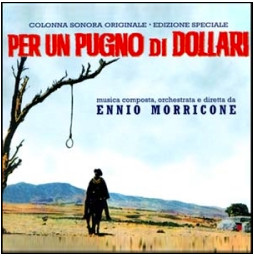PER UN PUGNO DI DOLLARI [A FISTFUL OF DOLLARS] (1964)
A Fistful of Dollars – Per Un Pugno di Dollari – is arguably one of the most influential films ever made. Although ‘spaghetti westerns’ – gritty action films set in the American west but largely filmed in places like Italy and Spain by European filmmakers – had been made before, it wasn’t until 1964 that they really became recognized as a major entertainment medium. Written and directed by the great Sergio Leone, the film is basically an unofficial remake of Akira Kurosawa’s Yojimbo; it starred a little known American actor named Clint Eastwood as a tough-talking amoral drifter who arrives in a small town on the Mexican border and, through a combination of manipulation and his skill as a gunfighter, successfully pits two rival families against for his own benefit.
The legacy of the film is almost incalculable; so many contemporary clichés of the Western genre were invented by Leone for this film, while the visual style and camera work Leone employed would influence filmmakers for decades. So too Ennio Morricone’s score for A Fistful of Dollars reinvented the sound of the Western genre, moving away it from the Americana sound of people like Aaron Copland and Jerome Moross towards something much more gritty and idiosyncratic. The two most famous pieces of the score are the main title, “Titoli,” and the eponymous theme, “Per Un Pugno di Dollari”
“Titoli” is an aggressive, punchy march initially anchored by a florid acoustic guitar, but eventually transitions to feature an iconic whistled melody, performed by the great Alessandro Alessandroni. As the pieces progresses it gradually picks a trilling flute, the sampled sounds of cracking whips and tolling bells, and a gruff male voice choir chanting the words ‘we can fight’. On paper, it sounds like a mess, but the execution is sensational, a truly original sound that had never been heard in cinema before, and which quickly came to define an entire genre.
The second theme, “Per Un Pugno di Dollari,” is more subdued, but no less iconic, with a strident virtuoso solo trumpet offset by a strumming acoustic guitar and choir. It pays homage to the musical heritage of Mexico, and perfectly encapsulates Eastwood’s character. It’s impossible to listen to this music without thinking of him, riding on horseback, chewing on a cigarillo, squinting in the sun. This is, truly, music which changed cinema forever.
This would be enough for most composers, but not Ennio Morricone, who fleshes out the rest of the score with several more iconic moments. “Quasi Morto” is a beautiful piece of folk-like music that further expands on the mythic status of Eastwood’s character with low-end pianos and harmonica. The action music is frenzied and chaotic, with especially notable trumpet performances which have to be heard to be believed. It’s all quite magnificent.
As one would expect given its legendary status the score for A Fistful of Dollars has been released dozens of times over the years. My choice for the best is the 2-CD set released by GDM Music/Intermezzo Media in 2014, which presents a digitally re-mastered version of the complete score on one disc, and the complete re-mastered score for Once Upon a Time in the West from 1968 on the second disc.
Track Listing: 1. Titoli (2:58), 2. Quasi Morto (1:40), 3. Musica Sospesa (1:02), 4. Square Dance (1:36), 5. Ramon (1:05), 6. Consuelo Baxter (1:18), 7. Doppi Giochi (1:41), 8. Per Un Pugno di Dollari #1 (1:26), 9. Scambio di Prigionieri (0:55), 10. Cavalcata (3:29), 11. L’Inseguimento (2:25), 12. Tortura (9:31), 13. Alla Ricerca Dell’Evaso (1:22), 14. Senza Pietà (2:08), 15. La Reazione (2:36), 16. Per Un Pugno di Dollari # 2 (1:49), 17. Per Un Pugno di Dollari Finale (1:09). GDM Music/Intermezzo Media Records GDM-00804, 38 minutes 10 seconds.











